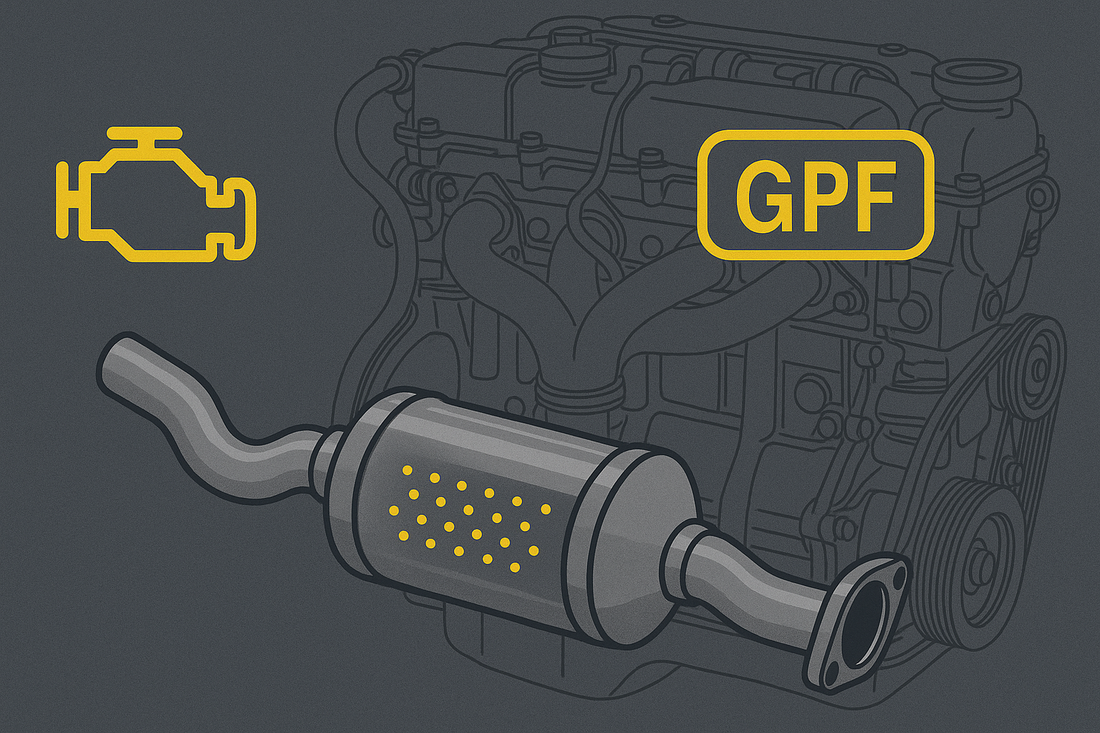
Particulate filter for petrol engines
Share
GPF/OPF Filters – Operation, Benefits and Common Faults
Gasoline Particulate Filters, known as GPF (Gasoline Particulate Filter) or OPF (Otto Particulate Filter), were introduced in response to stricter exhaust emission standards. Their main task is to reduce emissions of particulate matter that are created during the combustion of gasoline, especially in modern units with direct fuel injection.
GPF/OPF Operation
GPF filters operate similarly to DPFs (used in diesel engines), but are adapted to the specifics of petrol exhaust systems. They consist of a porous ceramic structure that retains particulate matter emitted during engine operation. The particles collected in the filter are periodically burned off in a regeneration process that can be initiated automatically during normal driving, without the need for driver intervention.
GPF regeneration takes place at higher exhaust gas temperatures (approx. 500–700°C), which is more natural for petrol engines than for diesel engines.
Benefits of using GPF
-
Reduction of particulate emissions : GPF effectively reduces the amount of particulate matter emitted into the atmosphere, reducing the negative impact of cars on air quality.
-
Emissions compliance : GPF filters allow car manufacturers to meet stringent emissions standards such as Euro 6c and Euro 6d-TEMP , which have been in force since 2018 .
-
Improved ecology and public health : Reducing particulate matter reduces the risk of respiratory and cardiovascular diseases related to air pollution.
Most Common GPF Faults
-
Filter clogging: This may be caused by frequent short-distance driving where exhaust gas temperatures are too low for full regeneration to occur.
-
Sensor failure: The differential pressure and exhaust gas temperature sensors may fail, disrupting system operation and preventing proper regeneration.
-
Incorrect fuel-air mixture: Problems with the injection system or lambda sensors can cause excess soot and accelerated filter clogging.
-
Improper regeneration: Interruption of the regeneration process due to short trips or frequent engine shutdowns.
Summary
GPF/OPF filters are a key element of modern petrol engines, which significantly reduce particulate emissions. They enable car manufacturers to meet the Euro 6c and 6d-TEMP emission standards introduced in 2018. However, their effectiveness and durability depend on the driver's driving style and regular vehicle servicing. Despite the failures that do occur, the ecological and health benefits resulting from their use far outweigh the potential operational difficulties.
Gasoline particulate filters (GPF/OPF) generate similar DTC errors as DPF, but are specific to gasoline technology. Here are the most common error codes:
1. GPF filter blocking errors:
P24A0 : Excessive soot in the GPF filter.
P24A4 : GPF filter flow efficiency problem.
P2002 : Particulate filter efficiency too low (also applies to GPF).
2. Errors related to the pressure difference sensor:
P2452 : Low signal from GPF differential pressure sensor.
P2453 : High signal from GPF differential pressure sensor.
P2454 : Differential pressure sensor input signal too low.
P2455 : Differential pressure sensor input signal too high.
3. GPF filter regeneration errors:
P2458 : GPF filter regeneration takes too long.
P2459 : GPF filter regeneration too frequent.
P24B0 : GPF filter regeneration efficiency below expected.
4. Temperature sensor errors:
P2031 : Problem with the exhaust gas temperature sensor before the GPF.
P2033 : Problem with exhaust gas temperature sensor after GPF.
P0546 : Exhaust gas temperature sensor - high signal.
P0544 : Exhaust gas temperature sensor - low signal.
5. General errors related to the GPF system:
P24C6 : GPF filter contamination - soot level too high.
P24D0 : The differential pressure sensor indicates no flow through the GPF filter.
P1400 : Particulate matter emissions too high.
P24A2 : Incorrect exhaust gas flow through the GPF filter.
6. Errors in cooperating systems:
P0101 : Mass Air Flow (MAF) Sensor Problem – Impact on GPF Regeneration.
P0299 : Boost pressure too low - GPF load.
P0171 : Fuel mixture too lean - affecting GPF efficiency.
P0172 : Fuel mixture too rich - causing GPF plugging.
7. Catalyst Errors (often related to GPF):
P0420 : Insufficient catalytic converter efficiency (Bank 1).
P0430 : Insufficient catalytic converter efficiency (Bank 2).
Common causes of GPF failures:
-
Filter contamination:
Accumulation of soot and ash due to short journeys and insufficient engine warm-up.
-
Incorrect fuel/air mixture:
Damaged injectors, MAF/MAP or lambda probe.
-
Ineffective regeneration:
Frequent interruption of the regeneration process during short trips.
-
Sensor failure:
Damage to the exhaust gas differential pressure or temperature sensors.
Fault prevention:
Regularly use the vehicle on longer journeys to allow for full filter regeneration.
Using appropriate oil and high quality fuel.
Quick response to other engine faults that may affect GPF regeneration.
